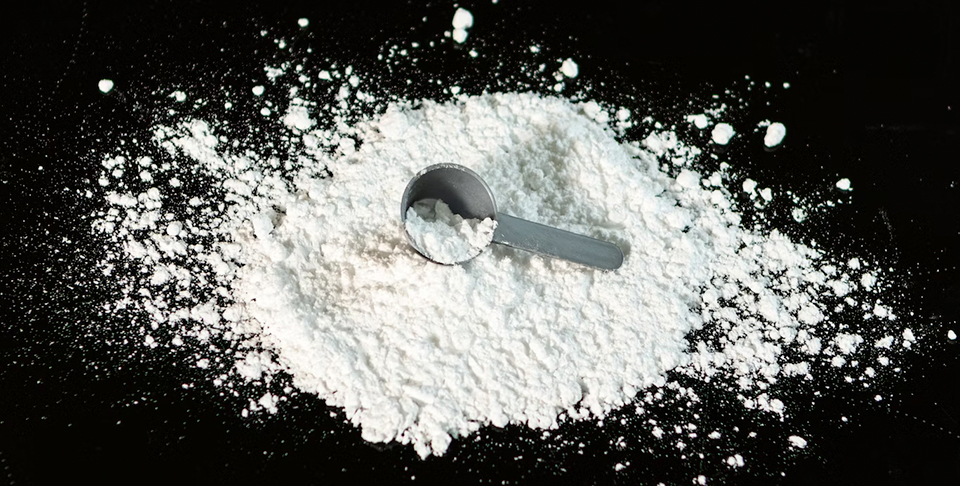Quick Agmatine Summary Points
- Agmatine is commonly found in pre-workout supplements and is classified as a nitric oxide booster
- Agmatine can be produced in the body from l-arginine, but in supplement form, it occurs as agmatine sulfate
- Its exact mechanism of action is ill-defined but is believed to be via blood pressure and pain perception modification
- Dosage recommendations are unclear due to the lack of research in humans, but common doses are between 500mg and 1000mg per day
What is Agmatine?
Agmatine (or Agmatine Sulfate) is a compound that is normally produced in the human body through a process in which l-arginine is decarboxylated and transformed into Agmatine. Since the compound first garnered attention in 1994, a plethora of research has been performed on Agmatine and its potential physiological and pharmacological effects, which can offer great therapeutic potential. Agmatine has been shown to be of benefit in a variety of areas including blood pressure control, pain relief and gut health.
Where Does Agmatine Come From?
As previously mentioned, Agmatine is produced in the body from the action of a particular enzyme that transforms L-Arginine into Agmatine. However, because the activity of that enzyme is rather low, we get a good majority from four other main sources:
- Formed and released in high amounts through bacteria in the gut and through pathogens in our body.
- Ingested food.
- Transformed gastrointestinal cells.
- Through circulation from the liver.
Generally meats, fish and shellfish contain high levels of Agmatine. It is also present in fairly high amounts in processed, fermented foods such as beer and sake.
Agmatine Benefits
Agmatine is an interesting compound because it can act as a signal-triggering molecule by binding to certain receptors in the body such as the imidazoline receptors and the α2-adrenoreceptors. There are 3 classes of imidazoline receptors and Agmatine can activate all three. Depending on the receptor Agmatine can help to:
- Help lower blood pressure
- Modulate pain and offer neuroprotection
- Regulate insulin release
Agmatine has also shown benefit in acting as an antidepressant and in several animal studies to be a possible therapeutic treatment for cancer, diabetes, brain and spinal cord injuries as well as neurodegenerative conditions such as Alzheimer’s and Dementia.
Agmatine Benefits For Bodybuilding
Agmatine has been used for a while now in the bodybuilding community as a supplement to help in the quest for increased muscle mass. While Agmatine itself has not been shown to impact muscle mass growth directly, it does offer several benefits that can help in achieving more muscle mass. As a potential strong neurotransmitter, it can improve the mind-muscle connection to improve the contractive efforts of our muscles. Stronger, more directed contractions can help promote improved effectiveness of exercises. Agmatine has also been shown to support the release of luteinizing hormone-releasing hormone or gonadotropin-releasing hormone which is responsible for increasing luteinizing hormone levels. Luteinizing hormone stimulates male Leydig cells to produce testosterone.
In addition, the pain-reducing effects of Agmatine can not only be helpful in chronic pain conditions limiting exercise but may also improve endurance capacity as pain can often be a limiting factor to performance. Agmatine’s possible ability to regulate insulin production and increase the uptake of glucose may offer benefits for glycogen storage as well as a downgrade in the amount of glucose being transformed into fat.
Agmatine Negatives & Side Effects
Thankfully, Agmatine is relatively safe to use even at high doses and seems to have very low toxicity in cells. In the first clinical trial of Agmatine, there were few side effects however a very small percentage of people experienced mild-moderate diarrhoea and mild nausea. This occurred at a level of over 3.5g/day for over 3 weeks.
Agmatine Recommended Doses & Ingredient Timing
Due to a severe limitation in human studies of Agmatine, there are no conclusive dosing recommendations for Agmatine supplementation. Common Agmatine-only supplements suggest a daily dose of around 750mg, however, up to 2.5g/day is tolerable without any known side effects. There are no indications that the timing of supplementation offers any greater benefits.
Agmatine Supplements
Agmatine is often included in test boosters as well as vasodilating supplements such as pre-workouts due to its ability to increase blood vessel size. Agmatine can also be sold as an individual ingredient.
Stacking Agmatine
Agmatine supplements can be stacked with natural growth hormone boosters to offer a greater ergogenic enhancement or carbohydrate powders to help boost glycogen resynthesis. In general, Agmatine is safe to take with most other supplement types.
Agmatine: In Conclusion
Agmatine, a compound naturally produced in the human body from l-arginine, has garnered significant attention since 1994 for its potential physiological & pharmacological benefits. This molecule, found in certain foods like meats, fish, shellfish, & fermented items like beer and sake, plays a pivotal role in blood pressure regulation, pain modulation, & insulin release.
It holds promise in the realms of mental health as an antidepressant & demonstrates therapeutic potential for various conditions, including cancer, neurodegenerative diseases, & injuries.
Within the bodybuilding community, Agmatine is hailed for its capacity to bolster the mind-muscle connection, potentially supporting testosterone production & its pain-relieving effects that can enhance endurance.
While research on Agmatine's exact dosage & mechanisms is still ongoing, its inclusion in pre-workout supplements & other health products highlights its growing reputation in the fitness industry. Its low toxicity, even at higher doses, makes it a generally safe supplement, with few reported side effects like mild nausea & diarrhea at very high doses.
References
1. Molderings GJ, Haenisch B. ‘Agmatine (decarboxylated L-arginine): physiological role and therapeutic potential.’ Pharmacol Ther. 2012 Mar;133(3):351-65. Epub 2011 Dec 22.
2. Keynan O, Mirovsky Y, Dekel S, Gilad VH, Gilad GM. ‘Safety and Efficacy of Dietary Agmatine Sulfate in Lumbar Disc-associated Radiculopathy. An Open-label, Dose-escalating Study Followed by a Randomized, Double-blind, Placebo-controlled Trial.’ Pain Med. 2010 Mar;11(3):356-68.


